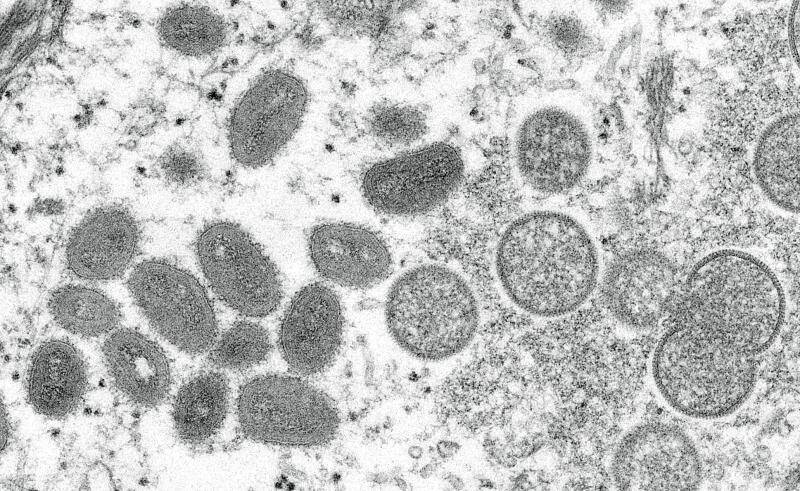A four-year boy tested positive for Monkeypox (mpox) Wednesday and is believed to have been infected by a family member, Taiwan’s first case of the disease in a child, Center Disease Center (CDC) Deputy Director General Lo Yi-chun (羅一鈞) said.
The boy began experiencing symptoms such as fever, eye discomfort and a rash, with vesicles on his limbs and trunk first presenting on the evening of June 1, Lo said Wednesday evening.
Because the symptoms did not improve, the boy was admitted to hospital on Monday and tested positive for mpox Wednesday, Lo said.

Photo: Reuters
The boy, who has mild symptoms, is still being treated at a local hospital, he added.
The CDC believes the case involves a household infection as the boy had contact with an individual previously confirmed as having contracted mpox in the family, Lo said.
Since the boy has been absent from the preschool where he is enrolled after coming down with the illness, the risk of transmission is low, but people he had close contact with at home and the preschool are required to closely monitor their condition for 21 days, Lo said.
Since the disease was designated a Category 2 communicable disease last June, Taiwan has reported 147 mpox cases, 135 transmitted locally and 12 abroad, according to the CDC.
Among the 147 cases, 10 remain in hospital, 54 are practicing self-health management at home, while 83 have recovered, the CDC said.

Nipah virus infection is to be officially listed as a category 5 notifiable infectious disease in Taiwan in March, while clinical treatment guidelines are being formulated, the Centers for Disease Control (CDC) said yesterday. With Nipah infections being reported in other countries and considering its relatively high fatality rate, the centers on Jan. 16 announced that it would be listed as a notifiable infectious disease to bolster the nation’s systematic early warning system and increase public awareness, the CDC said. Bangladesh reported four fatal cases last year in separate districts, with three linked to raw date palm sap consumption, CDC Epidemic Intelligence

The manufacture of the remaining 28 M1A2T Abrams tanks Taiwan purchased from the US has recently been completed, and they are expected to be delivered within the next one to two months, a source said yesterday. The Ministry of National Defense is arranging cargo ships to transport the tanks to Taiwan as soon as possible, said the source, who is familiar with the matter. The estimated arrival time ranges from late this month to early next month, the source said. The 28 Abrams tanks make up the third and final batch of a total of 108 tanks, valued at about NT$40.5 billion

Two Taiwanese prosecutors were questioned by Chinese security personnel at their hotel during a trip to China’s Henan Province this month, the Mainland Affairs Council (MAC) said yesterday. The officers had personal information on the prosecutors, including “when they were assigned to their posts, their work locations and job titles,” MAC Deputy Minister and spokesman Liang Wen-chieh (梁文傑) said. On top of asking about their agencies and positions, the officers also questioned the prosecutors about the Cross-Strait Joint Crime-Fighting and Judicial Mutual Assistance Agreement, a pact that serves as the framework for Taiwan-China cooperation on combating crime and providing judicial assistance, Liang

A group from the Taiwanese Designers in Australia association yesterday represented Taiwan at the Midsumma Pride March in Melbourne. The march, held in the St. Kilda suburb, is the city’s largest LGBTQIA+ parade and the flagship event of the annual Midsumma Festival. It attracted more than 45,000 spectators who supported the 400 groups and 10,000 marchers that participated this year, the association said. Taiwanese Designers said they organized a team to march for Taiwan this year, joining politicians, government agencies, professionals and community organizations in showing support for LGBTQIA+ people and diverse communities. As the first country in Asia to legalize same-sex